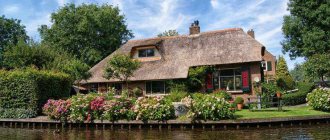How to register a barn with the cadastral register is a question that is most popular among owners of such outbuildings. This is easy to explain, since since the end of 2021 there have been rumors about punishment for tax evaders. Lawmakers have informed the public of their intention to conduct regular inspections of new construction. To identify unregistered objects, aerial photography is carried out. When violators are identified, a large fine is levied on the latter, which caused serious unrest among summer residents. The situation is aggravated by the fact that the authorities plan to punish defaulters, but do not give clear instructions.
GENERAL PROVISIONS
Today the expression “living on the earth” is becoming more and more common. Its meaning is clear. A person stands a building on his plot, processes the latter and collects the harvest. To ensure this process, the owner needs additional premises - a bathhouse, barn, greenhouse and other objects. In the future, when selling a structure, land and buildings are taken into account when setting the price. In other words, a residential structure on land will cost less than a property that is supplemented with useful outbuildings.
In practice, the sale of land plots and houses occurs subject to registration in the cadastral register. Objects sold must have a cadastral passport, as well as a personal license plate. Information about such structures is included in the Unified State Statistics Committee. However, adjacent buildings are often not registered. Owners are in no hurry to contact the cadastre body, which leads to a number of contradictions. On the one hand, the structures were erected on the site, but on the other hand, they are absent on paper. As a result, the buyer has no information about the area, technical parameters, year of construction and other characteristics.
When selling a property, the owners insist that the lack of registration does not matter. They argue that according to the law, there is no need to register these objects. If this is done, the owner will be forced to pay property taxes, which is an additional expense. Many summer residents ignore the necessary process due to a banal lack of information. They do not know how to register a household building with the cadastral register, what documents are required, and what punishment awaits in case of violation of the law.
On a note
Managing organizations and homeowners' associations, when servicing common property, must take this matter into account: in the courtyards of many old apartment buildings, outbuildings that are used by residents have been preserved. Owners and building managers need to decide together on the status of such buildings:
- If they are part of the common property, then this must be registered on the OSS and changes must be made to the Unified State Register data. It is also necessary to include fees for the maintenance of such buildings in the amount of payment for residential premises.
- If the buildings are not registered in any way and stand on municipal land, then the residents who use them can file a lawsuit in court. Such objects can be registered as property on several grounds: legalization of unauthorized construction or acquisition of the right to it by acquisitive prescription.
HOs, when managing a house with such objects in the yard, must make sure that someone is using them. It happens that the persons to whom the barn was transferred no longer live in the house for a long time, and the building is abandoned. Then, in the event of a fire or its collapse, the court may decide that the barn meets the characteristics of common property, and the management organization improperly maintained it or did not look after it at all.
WHAT DOES THE LAW SAY?
If you do not delve into the laws, current rules and regulations, but proceed from practice, the following situation arises. In particular, bathhouses, premises for chickens, sheds and other outbuildings must be registered in the cadastral register. At the same time, there is no need to register summer kitchens and verandas, shell-type garages, sheds and other objects that do not have a foundation. This category also includes collapsible greenhouses, canopies, frame-type pools and other objects. In other words, registration is not required if the object can be moved from place to place.
The next important point is the area. Based on legal norms, this parameter does not matter. The issue of quadrature is important when it comes to taxation. In particular, with an area of more than 50 square meters, the object is subject to taxation (Article 406 of the Tax Code of the Russian Federation). If an outbuilding cannot be classified as a capital structure or there are doubts on this issue, it is recommended to invite a specialist from the cadastre authority. An employee of this organization draws up an inspection report and makes a decision - a capital structure or not.
If the barn is used by several owners, then it meets the criteria of common property
The owner of the apartment filed an appeal: the family has been using the barn for more than 60 years. All auxiliary buildings of the apartment complex remained in use by the apartment owners. According to the conclusion of the construction and technical examination, which the plaintiff provided to the court, the barn is suitable for further use.
But the appellate court agreed with the arguments of the first instance: the barn meets the criteria for unauthorized construction. At the same time, the judge additionally indicated that the disputed building is not a permanent structure. Therefore, registration of ownership of it in the manner prescribed by law is impossible.
As the judge pointed out, the barn is located in the local area, meets the criteria of common property, and therefore belongs to all owners of the apartment building premises on the right of common shared ownership. The barn cannot be transferred to the personal property of the plaintiff. At the same time, none of the residents of the apartment building disputes his right to continue to use the barn.
The resident of the house filed a cassation appeal, but here, too, the court did not agree with his right of ownership of the barn.
Can the local self-government council give away part of the MKD plot for development without land surveying?
POSITION OF THE MINISTRY OF PROPERTY AND GOVERNMENT OF MOSCOW REGION (MOSCOW REGION)
Recently, unregistered buildings have been identified from above. At the same time, special devices record absolutely all objects and even those that do not need to be registered. In particular, swimming pools, hangars, greenhouses and other structures that do not have a close connection with the land plot and are not equipped with a foundation are noted. As a result, the owners will have to prove that the discovered object does not belong to a capital structure. As a result, the building does not need to be registered. To confirm this fact, you need to take and send photographs to the address of the Ministry dealing with property relations in the Moscow Region.
As for the government’s position, all capital structures are subject to registration. We are talking about garages, bathhouses, outbuildings and other objects. As for taxation, it is relevant for buildings with an area of 50 square meters or more. For other structures, such as greenhouses, gazebos, swimming pools and other objects, their registration is not required.
Indentations from the boundaries of the site during the construction of outbuildings
Buildings are placed on a site plan in advance to ensure that there is enough space and that the location does not violate established requirements. The distance from the border of the site to the building should not exceed 1 m. In order not to violate the setbacks and not disturb neighbors, construction rules are followed and landmarks and distances are taken into account when taking measurements. For example, if the distance of the protruding element of the outbuilding is no more than 0.5 m, the offset is calculated from the base. Otherwise, the indents are measured from the protruding parts. If construction norms and rules are not observed, the object can be registered in court.
WHEN IS IT REQUIRED TO PUT A SHED OR OTHER OUTDOOR BUILDING ON THE CADASTRE REGISTER?
In the Russian Federation, registration of outbuildings occurs after submitting the appropriate application. As a rule, such a structure is subject to registration if it belongs to the category of a capital facility, and a person plans to obtain ownership rights to it. A barn or other outbuilding erected on a foundation must be registered in the cadastre. In this case, the decision on whether an object belongs to this category is made by representatives of authorized bodies.
There are a number of additional reasons why citizens of the Russian Federation decide to contact the cadastral authority:
- Resolution of problems with government authorities and neighbors is required.
- A barn or other outbuilding is used to service a group of houses.
- Property insurance is required.
- The building is sold, rented or donated.
If a shed in a building has a common wall with a residential building, that is, it plays the role of an auxiliary building, its registration takes place simultaneously with the main structure.
The Supreme Court determined the status of a yard shed
In 2021, Alexey Timurov* filed a claim for recognition of ownership of an outbuilding under the rules of acquisitive prescription. The man explained that in 2008 his parents gave him their apartment, which they registered as their property in 1994. In fact, they lived there since 1952, Timurov said. And all this time they used the shed in the courtyard of the house where the apartment is located.
The courts decided that the barn was a common building
The Supreme Court clarified the rules on unauthorized construction.
The Bavlinsky City Court of Tatarstan rejected the claim. The barn had signs of an unauthorized structure that was illegally occupying municipal land, he decided. That is, the plaintiff owns this property in bad faith, and in this case the rule on acquisitive prescription does not apply (case No. 2-854/19). The Supreme Court of Tatarstan agreed with this.
The appeal added that this barn is a non-permanent building. This means that it is impossible to register ownership of it. And in general, this outbuilding belongs to the common property - it is in the common shared ownership of those who own the premises in the apartment building, the second instance concluded (case No. 33-4445/2020).
This approach survived in the Sixth Court of Cassation of General Jurisdiction, so Timurov went to the Supreme Court of Russia.
The Supreme Court calls not to confuse the Civil Code with the Urban Planning Code
In the Supreme Court, the dispute was considered by a panel chaired by Elena Getman. The judges recalled that the Civil Code provides for different rules for recognizing the right of ownership of real estate as an unauthorized construction and through acquisitive prescription. This means that the subject of proof for these two claims is different.
The Constitutional Court clarified the acquisitive prescription
In the Timurov case, first of all, it was necessary to determine whether the barn was real estate, the Supreme Court emphasized. The appeal did something strange. She established that the barn is a non-permanent building and that ownership rights to it cannot be registered. And the first instance proceeded from the fact that this outbuilding was real estate. The Supreme Court calls for a distinction between the terms “capital construction facility” and “real estate”. The first of them is a special concept from urban planning legislation, and the second has “a different industry, scope and content.”
Compliance with the characteristics of a capital construction project does not mean that the object is real estate within the meaning of Art. 130 of the Civil Code, recalls Anton Novikov, Advisor to the Regionservice Bar Association Regionservice Federal Rating. group Family and inheritance law group Criminal law group Environmental law group Arbitration proceedings (major disputes - high market) group Natural resources/Energy. According to the Civil Code, real estate is objects that are connected to the land in such a way that their movement without disproportionate damage to their purpose is impossible, adds Irina Oreshkina, project manager at the Law Office S&K Vertical S&K Vertical Federal Rating. group Bankruptcy (including disputes) (mid market) group Arbitration proceedings (major disputes - high market) group Dispute resolution in courts of general jurisdiction group Family and inheritance law group Private capital 3rd place By revenue per lawyer (more than 30 lawyers) 10th place By revenue 24th place By number of lawyers. “The current legislation does not contain clearer criteria,” she emphasizes.
VS: when will the barn actually be shared?
The Supreme Court also did not agree with the qualification of the barn as common property of an apartment building.
An outbuilding will be a common building if it is “functionally designed to serve more than one residential premises,” the Supreme Court explained.
In particular, the fact that the disputed shed is located on a site intended for the maintenance, operation and improvement of this apartment building is important, follows from the decision of the Supreme Court. Moreover, he emphasized, it is impossible to say at the same time that a barn is an unauthorized construction and common property. These conclusions are mutually exclusive (case No. 11-KG21-1-K6). The appeal will have to think about all of this during the rehearing of the dispute, which is scheduled for June 10, 2021 (Case No. 33-8023/2021).
*Name and surname have been changed by the editors.
- Ekaterina Korobka
- Supreme Court of the Russian Federation
- Civil process
EXPERT OPINIONS
When considering the question of how to register a household building with the cadastral register, it is important to take into account the nuances of the legislation or study the opinions of experts. Many claim that the Tax Code of the Russian Federation (Article 407, paragraph 1, paragraph 15) states that an individual has the right to count on a tax benefit. It applies to buildings that have an area of up to 50 square meters. If the building has a large area, and its owner does not belong to the category of pensioners, registration with Rosreestr is mandatory. To do this, you need to order the services of a cadastral engineer who makes a technical plan for the building.
It is important to understand that property tax for individuals is collected on the basis of information provided by Rosreestr. If the owner has not registered the property with the cadastral register, such a fact is considered from the position of inaction and evasion of the owner from paying taxes. In addition, the Tax Code of the Russian Federation states that for plots purchased for individual housing construction, after 10 years, the tax amount is calculated with a doubled coefficient.
As noted, a dacha amnesty is used to register buildings classified as permanent. The difference with previous years is that a technical plan is now required. Only the cadastre employee is involved in the preparation of this document. As soon as the benefit ends, you will still have to apply for permission to enter. As of June 2018, preparing a technical plan takes up to 10 days. First, an engineer goes to the site to take measurements and determines the coordinates. Next, he processes the information and prepares it for sending to Rosreestr. After this, the owner personally submits an application and papers to the cadastre authority or MFC.
When contacting commercial companies, the service of preparing a technical plan will cost 14-18 thousand rubles. Much depends on the number of buildings. Some companies provide additional services, namely accompanying the client throughout the registration period. We must also not forget that the cost of registration is becoming more expensive each time, and the complexity of cadastral registration is increasing. That’s why experts strongly advise against delaying this process.
The dacha amnesty has been extended until 2021
From August 2, the dacha amnesty has been extended once again. And this is again not the same as before. Several laws have already been called dacha amnesty, but they all work differently. The general essence of all amendments about plots, houses and ownership is that registering real estate will be easier and cheaper.
Dacha amnesty refers to laws that somehow simplify the preparation of documents for a residential building or plot. But the phrase is the same, but the amendments work differently. They can only concern land plots, the cancellation of building permits or the legalization of houses only according to the technical plan.
You might be interested ==> What parents get for their fourth child in the Moscow region
Dacha amnesty extended until 2026: how to register a house in SNT
Today, a plot of land located in a gardening (dacha) partnership, as well as buildings on it, can be registered with the provision of a minimum set of documents for this. After registration of land ownership, a residential building can be registered only with the following documents:
Federal Law No. 340-FZ, which came into force on August 4, 2018, introduced changes to the procedure for the construction of garden and residential buildings on plots of land intended for individual housing construction, private household plots and gardening. Now the construction and reconstruction of real estate on such lands requires notification of the local administration.
It is no coincidence that the rules for construction on a garden plot prescribe distances from the border with the neighbors’ land. After all, buildings erected without taking these distances into account may interfere with other people. For example, a house next to a fence can block part of the neighbors’ land from the sun, which will negatively affect the harvest. And a toilet built at too close a distance will annoy you with not the most pleasant odors.
The boundaries of each plot in a gardening partnership must be separated by a fence on all sides. But in accordance with SP 53.13330.2019, building a blind fence is prohibited. According to clause 6.2 of this set of rules, mesh material must be used for fencing between areas.
- absence or incompleteness of title documents. We are talking about a contract of sale, gift or exchange, as well as inheritance. The absence of any of them seriously complicates the registration of property rights;
- increasing the boundaries of the land plot during use. In this case, registration of ownership becomes a good way to legitimize the change that has occurred. An additional condition is obtaining consent to new borders from neighbors;
- the possibility of free use of land for 6 years with the subsequent right to register ownership, which is provided to certain categories of beneficiaries;
- the costs of preparing a boundary plan and other related documents are borne by the future owner, which often amounts to an impressive amount of additional costs.
You might be interested ==> Income type codes for 3 personal income taxes for 2021
The exercise of the right to register a dacha plot as a property is often accompanied by the emergence of various problems. For example, if you want to register abandoned land. In this case, you should find the owner of the plot and try to solve the problem with him. If this is a local government authority, you must submit a statement of desire to become the owner. Typically, in such a situation, the land is put up for auction.
Which houses are not subject to registration?
It is worth noting that in a number of regions there are benefits for socially vulnerable categories of citizens. Thus, in a number of regions, pensioners and disabled people have benefits for paying land tax. At the federal level, they do not pay for country houses, bathhouses and other buildings that do not have residential status. When selling property
Pensioners pay a mandatory amount of income tax along with other citizens.
The essence of the dacha amnesty is not at all to grant some wonderful rights. You will still have to register rights to buildings and land and provide documents for this. But the registration procedure itself becomes much simpler, and many additional documents have received legal status.






